Share
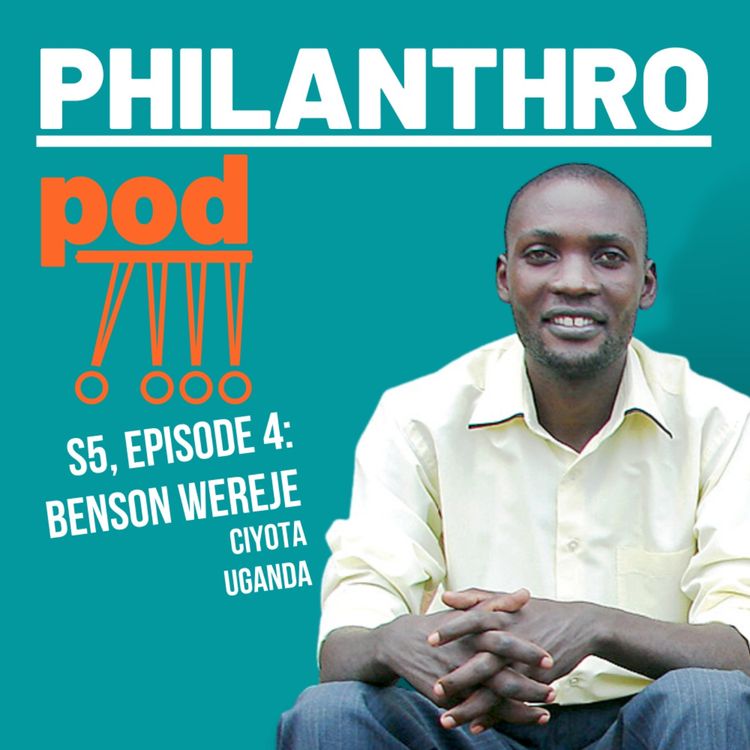
Philanthropod
Perseverance despite the unimaginable: a commitment to education, community and peace in the DRC and Uganda
Content Warning// trauma, violence, gender-based violence
Please be advised that listener discretion is advised as some parts of this conversation are distressing
In 1995, Benson Wereje's village in the Democratic Republic of Congo was attacked by rebels. He was separated from his parents and he endured unimaginable bloodshed before reaching a refugee camp in Uganda. More than five million of Benson's friends and countrymen have been killed in his home area.
Dedicated to empowering youth and imbued with a deep admiration for the transformative impact that education can provide his country, Benson co-founded and became Executive Director of CIYOTA in 2005. Today, CIYOTA educates thousands of children and youths in refugee camps, focuses on community building and strives to unite tribes in the DRC to bring enduring and sustainable peace.
Join Philanthropod’s host, Anubha Rawat, in an eye-opening and honest discussion with Benson about experiencing and overcoming trauma, how a commitment to equality, forgiveness and education was instilled in him by his father, and how he continues to be inspired by his wife - a modern ‘heroine’. Benson leaves you with a powerful message as to why he believes it is his mission to train young people in responsible leadership and create a unified vision for their country.
For his work, Benson has been awarded the Desmond Tutu fellowship with African Leadership Institute at Oxford University in 2013, an Echoing Green fellowship in New York, the ASHOKA fellowship in 2015 and was a Tony Elumelu Foundation awardee in 2019.
To learn more about CIYOTA follow the link: https://www.coburwas.org/
More episodes
View all episodes
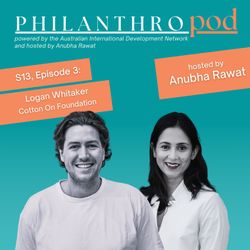
3. From Tote Bags to Transformation: How the Cotton On Foundation Is Redefining the Role of Corporate Foundations in International Development
34:57||Season 13, Ep. 3Cotton On is Australia’s largest fashion retailer, but it is their commitment to education, youth mental health, and climate action that sets them apart from a typical business.From selling $5 tote bags, water bottles or reusable face masks to their youth-based market, the Cotton On Foundation has become a model for how Australian businesses can make a transformative impact in international development.In this episode, Philanthropod’s host, Anubha Rawat, sits down with Logan Whitaker: Global Engagement Manager at the Cotton On Foundation. Together, they explore the Cotton On Foundation’s journey, model and aspirations moving forward. Beginning in 2007 with the reconstruction of a single classroom in Uganda, the Cotton On Foundation now supports 22 schools in Uganda, alongside climate and mental health initiatives across four continents.At the centre of their model is a commitment to partnering with government schools and fostering their financial independence through trust-based relationships and mobile money systems for fee collection. They also take a whole-of-systems approach - including focusing on leadership and identifying opportunities to support students past primary school, to high school, and even to vocational studies where possible. In many ways, the Cotton On Foundation occupies a unique space between international development funder and implementer.Looking ahead, the Cotton On Foundation is now aiming to complete its mission in Uganda - a vision that requires the construction of 19 additional schools. Presenting a unique opportunity for the sector, they are now seeking businesses, corporates, and funders to partner with them to ensure that Uganda’s rapidly growing population has access to quality education for generations to come.This episode is recommended listening for anyone interested in the evolving role of corporate foundations within Australia’s changing international development and philanthropic landscape.Learn more about the Cotton On Foundation here: https://cottonongroup.com.au/the-good-we-do/cotton-on-foundation/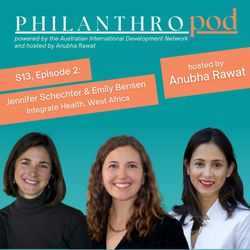
2. The Courage to Found and the Humility to Hand Over
41:02||Season 13, Ep. 2What role can NGOs play as “learning labs” for public policy in the Majority World?How can Community Health Workers (CHWs) help scale locally-led health programs?And why are leadership succession plans so vital for founder-led organisations?In this episode of Philanthropod, host Anubha Rawat sits down with Jennifer Schechter (Co-Founder & CEO) and Emily Benson (Chief Partnerships Officer) of Integrate Health. Founded in Togo in 2004 with a focus on HIV healthcare, Integrate Health has since expanded to partner with the Togolese and Guinean governments to improve access to quality primary care by integrating CHWs into national systems. Holding over 700 community meetings each year, Integrate Health uses community-led data and digital tools to strengthen health outcomes. They collect 13,000 household surveys and track 150,000+ CHW visits annually, creating a vital feedback loop for continuous improvement - from maternal health to child mortality to vaccine delivery.Throughout the episode, Anubha, Jennifer and Emily discuss the role that NGOs can play as “learning labs” for governments. Often facilitated by philanthropic funding, NGOs can take more risks, test ideas and generate evidence in ways governments can't. In turn, this provides evidence-based models that governments can adopt, ensuring long-term sustainability in line with national health policies.The episode also explores the importance of leadership transitions in founder-led NFPs. After two decades as CEO, Jennifer will step back to join the Board in December 2025 and Emily will step in as CEO. This has been a deliberate and strategic decision to demonstrate both Integrate Health’s organisational resilience but also commitment to employee growth.👉 Learn more about Integrate Health here: integratehealth.org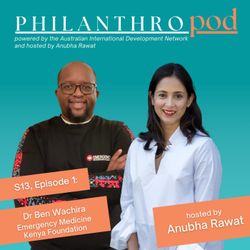
1. When Every Second Counts: Kenya’s Emergency Care Revolution
33:22||Season 13, Ep. 1In this episode, Anubha speaks with Dr. Benjamin Wachira, Kenya’s first emergency physician and the visionary behind the Emergency Medicine Kenya Foundation (EMKF).Ben reflects on his journey from a bright-eyed medical student eager to save lives, to recognising a devastating gap in his training: there was no structured preparation for handling patients in life-or-death situations. During his years studying in South Africa, he witnessed trauma cases from stabbings, shootings, and road accidents being treated every day - cases he realised he had never seen in Kenya. The reason was stark: most Kenyan patients in emergencies never made it to the hospital at all.That realisation set him on a mission to transform emergency care back home. Through EMKF, Ben has worked alongside government and healthcare providers to build a system that was once non-existent. From drafting Kenya’s first national emergency healthcare policy (now enshrined in law) to creating emergency protocols, training frontline providers, and expanding public ambulance services from zero to ten, his work has started to reshape the system. Emergency departments in counties across the country are being renovated and equipped, and thousands of patients are now receiving lifesaving care each year who otherwise would not have had a chance.As EMKF has grown, its work has reached beyond Kenya, offering research, tools, and lessons to support neighbouring countries as they develop their own systems. Ben’s story is one of persistence and vision, showing how one determined physician can not only save lives at the bedside, but reimagine an entire nation’s approach to emergency care.Tune in to hear how emergency medicine is being transformed in Kenya, and why Ben believes access to timely care must be recognised as a basic right.Philanthropod is powered by the Australian International Development Network and hosted by Anubha Rawat. Thank you to Compact Sound for editing and mixing. For more information about AIDN, and for more episodes, visit: www.aidnetwork.org.au. For more information about Emergency Medicine Kenya Foundation, visit: https://www.emergencymedicinekenya.org/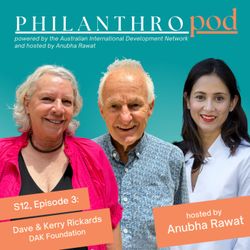
3. The Business of Bold Philanthropy
42:16||Season 12, Ep. 3What happens when two entrepreneurs turn decades of business grit into bold, practical philanthropy? In this warm and engaging conversation, host Anubha Rawat sits down with Dave and Kerry Rickards, founders of the DAK Foundation and the DAK International Network. Having worked alongside them for more than a decade, Anubha brings out both the personal and practical sides of their remarkable journey.Dave and Kerry married in 1971, dropped out of university, and soon after started a small market stall in Sydney. By 1973 they had moved into opals and jewellery, and in 1979 with another couple they co-founded Clints Crazy Bargains. Over the next two decades the discount variety store grew to more than 100 outlets before being sold in June 2000. With four children and a lifetime of entrepreneurial lessons behind them, they turned their attention to giving.The Rickards then spent ten years travelling the world, meeting hundreds of NGOs across dozens of countries. They saw duplication, wastage and an overemphasis on capacity development rather than capacity utilisation. Most of all, they realised the striking difference in costs, where meaningful change in low- and middle-income countries could be achieved at a fraction of the price. Those insights shaped their philanthropic philosophy: find existing infrastructure, resource it, and get the job done.Today, through the DAK Foundation and the DAK International Network, their giving focuses on restorative eye surgery, essential medical equipment, women’s health and family planning. In this episode, Dave and Kerry reflect on how they got started, the lessons they learned along the way, and the people who inspired their giving, including the legendary Chuck Feeney. With warmth and humour, they show that philanthropy can be bold, deeply human, and guided by a simple truth: it’s not just about where your money goes, but how it can create lasting change.Thank you to Ian at Compact Sound for recording and mixing and our host Anubha Rawat. Philanthropod is powered by the Australian International Development Network - www.aidnetwork.org.auTo find out more about the DAK Foundation and DAK International Network, visit: https://dak.org.au/ and https://dakinternational.org/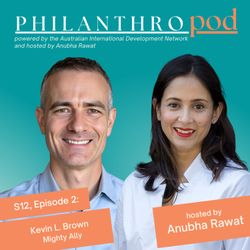
2. Unlocking growth: Branding, storytelling and the future of fundraising
35:21||Season 12, Ep. 2What does it really mean to be “funder ready”?What makes an impactful storyteller?And is there a risk that funders might become skeptical if your marketing is “too slick?”These are just a few of the thought-provoking questions we explore in the second episode of Season 12 of #Philanthropod.Host Anubha Rawat sits down with Kevin L. Brown, CEO of Mighty Ally. In a world where only one in 1,000 non-profit organisations grow beyond a small business, Mighty Ally builds brands to maximise funding through its Fundable & Findable Framework. Kevin is also a leading voice on LinkedIn and Substack and just released his first book: Fundable & Findable: The Brand-New Way to Fix Your Nonprofit Fundraising.Anubha and Kevin discuss Kevin’s transition from the advertising agency world to international development and the non-profit sector. Deeply influenced by the orphan crisis and his own experience as a father to three daughters from Uganda and China, Kevin began his journey in the sector by shadowing Lwala Community Alliance. Since then, his team has led some of the most powerful brand strategies for leading organisations including Food4Education and CHIC.Throughout the episode, Anubha and Kevin unpack:Why positioning and clarity are critical for all non-profit organisations;How to scale without losing the “soul” of your organisation;What funders are really looking for and how to stand out; and The simple, essential steps every organisation should take to strengthen its brand today.If your organisation is looking to scale, feeling “stuck” in its fundraising, or hoping to diversify its donor base, this conversation is for you.Learn more about Mighty Ally here: https://mightyally.org/about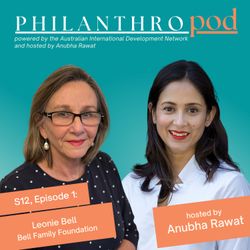
1. Living Her Best Life Through Giving
28:02||Season 12, Ep. 1In this heartfelt episode of Philanthropod, Anubha Rawat sits down with Leonie Bell, a passionate philanthropist whose life and giving are grounded in a deep belief in the transformative power of education and gender equality.From a free-range Australian childhood to volunteering in 1990s America, Leonie shares the pivotal moments that shaped her philanthropic path - from witnessing systemic inequality in food banks in America to a life-changing encounter in a Ugandan informal settlement where a family of nine slept in shifts on the floor because of poverty.Now at the helm of the Bell Family Foundation, Leonie champions trust-based philanthropy and unrestricted giving, working alongside her daughter to back women-led organisations across the globe. She opens up about the personal motivations behind her commitment to women and girls, and how her approach to philanthropy changed after joining an AIDN Insight Tour.Anubha and Leonie discuss influences, shared humanity and legacy. They agree on the importance of building trust with partners and why meeting grantees face-to-face continues to be one of her most powerful due diligence tools. As Leonie celebrates a milestone birthday this year, she reflects on the fun way she is incorporating this into her giving, and how philanthropy is bringing her more joy than she ever imagined.With thanks to Leonie Bell, our host Anubha Rawat and Ian at Compact Sound.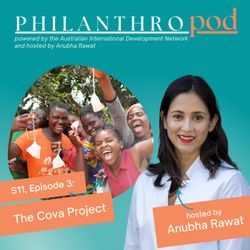
3. From period poverty to dignity, confidence, and education
33:43||Season 11, Ep. 3For millions of women and girls around the world access to menstrual hygiene or period products is not a given. In fact, in many low-income communities in the Majority World, menstrual hygiene products are often considered luxury items. Period poverty particularly affects young girls at a critical time in their lives, impacting their education and self-confidence. Many young girls in the Majority World even stop attending school because they are unequipped to manage menstruation.But for Geena Dunne this issue had to be solved. Geena recognised that all women and girls deserve to menstruate with dignity and confidence. She also understood the powerful ripple effect that confident, educated women can have on their communities and economies.In this episode of Philanthropod, Anubha Rawat meets with Geena Dunne - Founder and CEO of The Cova Project. Anubha and Geena discuss how The Cova Project provides menstrual cups and menstrual health education to girls and women in low-income communities around the world. They aim to bridge the school attendance gap, caused by period poverty.What’s more? This episode also features on-the-ground perspectives from Lillian Bagala (Regional Director at the Irise Institute East Africa), Mr. Kisambira Eria (District Education Officer in Jinja and male champion of the menstrual cup), and three young women in Uganda whose lives have been changed by The Cova Project. These perspectives are captured by Anubha whilst she is on the road in Uganda, and allow our listeners to understand the wider impact and system in which The Cova Project takes place.This episode is essential listening for anyone passionate about gender equality, women’s health, and the sensitive cultural conversations needed to truly empower young women around the world.To learn more about The Cova Project follow the link: https://www.thecovaproject.com/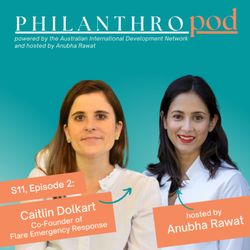
2. When every second counts: how Flare Emergency Response is revolutionising emergency response in East Africa
33:00||Season 11, Ep. 2You’re a pregnant woman living on the outskirts of Nairobi. You recognise the early signs of labour and need to get to the hospital. But your family members are at work and cannot drive you. You also don't have the means or access to public transport. What do you do?For millions of people in the Majority World, this is a daily reality - where ambulance services are neither embedded nor coordinated into the health system, or are simply too expensive for low-income communities.Striving to respond to this urgent gap, Caitlin Dolkart co-founded Flare Emergency Response - a subscription-based emergency-response platform, ensuring life-saving ambulance services for Kenyans. In this episode, Anubha Rawat and Caitlin discuss the Flare Emergency Response journey - from inception to launching in 2018, to now coordinating 800 ambulances and 70 aircraft, a roadside assistance program, and managing contracts in over a dozen countries in Africa, including Uganda and Tanzania. Anubha and Caitlin also dive into finances, including how initial funding from philanthropy, venture capital and impact investors helped launch Flare Emergency Response, but why an ambulance membership model is key to long-term sustainability. They discuss the role of technology, how the team has worked to ensure coordination between existing health providers, and the innovative pricing models that make these emergency services accessible to as many as possible. Ultimately, this powerful episode is an important reminder about how global development interventions require detailed systems-wide research for real gaps to be identified and for true impact to be created and scaled. To learn more about Flare Emergency Response follow the link: https://flare.co.ke/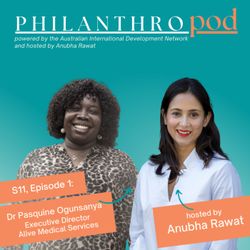
1. Crisis & resilience: HIV care in Uganda amid a global aid funding freeze
30:32||Season 11, Ep. 1In our first episode of Season 11, Anubha Rawat comes to you live from Uganda where she meets with Dr Pasquine Ogunsanya, Founder and Executive Director of Alive Medical Services (AMS). Founded in 2007, AMS is a leading organisation in the fight against HIV/AIDS and for Sexual and Reproductive Health and Rights (SRHR) in Uganda. The AMS Medical Centre operates 24/7, providing free, life-saving care to vulnerable communities.Dr Ogunsanya discusses her pioneering work in patient-centred care and her leadership in Uganda’s local, regional and national fight against HIV/AIDS. AMS tests over 600 new clients each month, linking an average of 96 HIV-positive clients to comprehensive care. It also provides free antiretroviral treatment (ART) to over 13,000 clients, including 1,500 HIV-positive youth and adolescents. Annually, AMS serves over 218,000 vulnerable clients with high-quality HIV/AIDS and SRHR care.The episode also gives our listeners a candid and on-the-ground insight into the impacts of the USAID funding freeze. Dr Ogunsanya describes the anxiety and fear the stop-work order has caused, and explains how AMS has had to reduce programs and medical provision – even despite a surge in client numbers as other clinics and services are shutting down.Despite these circumstances, Dr Ogunsanya has been inspired by AMS’ incredible staff who have continued to work as volunteers and the ongoing support of other donors. Dr Ogunsanya’s vision of a world in which those in need of medical care have access to state-of-the-art medical services provided with love and dignity is only growing stronger.For her work in HIV/AIDS care, women’s empowerment, and social development, Dr Ogunsanya has received a number of awards including Outstanding Humanitarian Work in Health and HIV/AIDS (Keep a Child Alive, 2007) and a recognition award from Uganda's Ministry of Health for her outstanding performance in HIV/AIDS response (2011).To learn more about Alive Medical Services follow the link here: https://amsuganda.org/